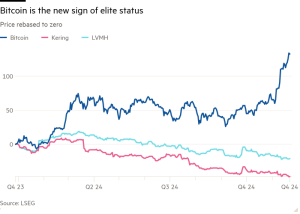Radio Free Afghanistan — the Taliban, the tribal warlords and the TV tycoon
Unlock the US Election Countdown newsletter for free
The stories that matter on money and politics in the race for the White House
Who are the good guys and who are the bad guys? It is a question that pops up over and over throughout Radio Free Afghanistan, Saad Mohseni’s impassioned memoir of his time as an Afghan media mogul during the US occupation.
It wasn’t that Mohseni wanted to know the answer. It was the premise of the question itself that bothered him. He kept getting asked this question, mainly by American generals and politicians. It made him worry for the future of his country.
For Mohseni, who ran Moby, Kabul’s most successful media company, it betrayed a maddeningly flawed view of the world, one which informed a policy that ultimately failed. “The Americans were always looking for a silver bullet in Afghanistan. ‘Is he a good guy or a bad guy’? They were fond of asking me, as though anyone’s character could be reduced to that simple binary.”
Mohseni knew that was not the reality in Afghanistan, where many of the good guys were, in fact, quite bad. From Hamid Karzai, the first president after the US occupation, to Ashraf Ghani, the last, Afghanistan’s leaders surrounded themselves with warlords who had committed war crimes, brutalised the population and stole hand over fist. They were the good guys.
Meanwhile, he understood the intentions inherent in the bad guys. The Taliban “think that it’s because of us their relatives were killed. Their young men went to fight. The Americans dropped bombs on their villages. That’s what they think about journalists. They see us as the enemy.”
It is the subtleties that make Radio Free Afghanistan perhaps the best of the memoirs of Afghanistan so far published, simply for Mohseni’s perspective on the quixotic and ultimately failed American effort to bring democracy and rid the country of the Taliban.
His view of the country is through the eyes and ears, mainly of his reporters and editors at Arman, the radio station, and TV station TOLO, both of which were founded with the help of USAID (US Agency for International Development) funds in the early 2000s.
Mohseni, the son of an Afghan diplomat, left Kabul as a boy when his father was posted to Tokyo. Later, the family became refugees after his father resigned his post amid the 1979 Soviet invasion of Afghanistan. He grew up in Australia, but his nostalgia for his homeland was so powerful that, at the first opportunity, he went to post-Soviet Uzbekistan on the Afghan border to look for business opportunities.
Arriving in Kabul after the fall of the Taliban in 2001, he wanted only one thing: to live in his homeland and find businesses to invest in. He pursued an idea about almond farming until a chance meeting with Afghanistan’s culture minister planted an idea: a radio station. Then came TV which took him into the realm of pop music, Bollywood dramas (with Hindu deities pixilated) reality TV shows and the question of putting women announcers on screen (he did).
But Mohseni writes mainly about the news they covered. Here, I am relying on my knowledge of the man and his reputation among foreign journalists posted to Afghanistan (though we have never met): he must take a place in the pantheon of editors and publishers who have successfully navigated the toughest working environments in journalism.
A fair bit of compromise is involved — Mohseni recounts numerous meetings with irate ministers, not to mention Presidents Karzai and Ghani — listening to their complaints about the muckraking reporting on pervasive corruption. “Corruption became as big of a beat as the war itself,” he recalls. It preoccupied the viewers and listeners even more than the war.
“There were elections, but there was no accountability,” he writes. “And in the provinces, among the ghost schools and ghost roads and ghost wells and the very real presence of American soldiers and drones and night raids and extrajudicial killings, the Taliban only grew stronger.”

The dramatic fall of Kabul frames the book — TOLO broke the news that the government had fallen and Ghani had fled. Afterwards, instead of packing up and leaving, TOLO stayed, though many of its staff emigrated. The Taliban government has allowed Moby to stay open while its officials regularly participate in panels and are interviewed for stories.
While the “bad guys” have replaced the “good guys,” they still need Moby to show they tolerate women on the air, to show the world that they are not the same Taliban. As he notes, “The Taliban understand there would be a backlash if we suddenly went dark.”
Radio Free Afghanistan: A Twenty-Year Odyssey for an Independent Voice in Kabul by Saad Mohseni with Jenna Krajeski, William Collins £25, 272 pages/HarperCollins $32, 320 pages
Charles Clover is the FT’s Foreign Affairs Correspondent
Join our online book group on Facebook at FT Books Café and subscribe to our podcast Life and Art wherever you listen
#Radio #Free #Afghanistan #Taliban #tribal #warlords #tycoon




